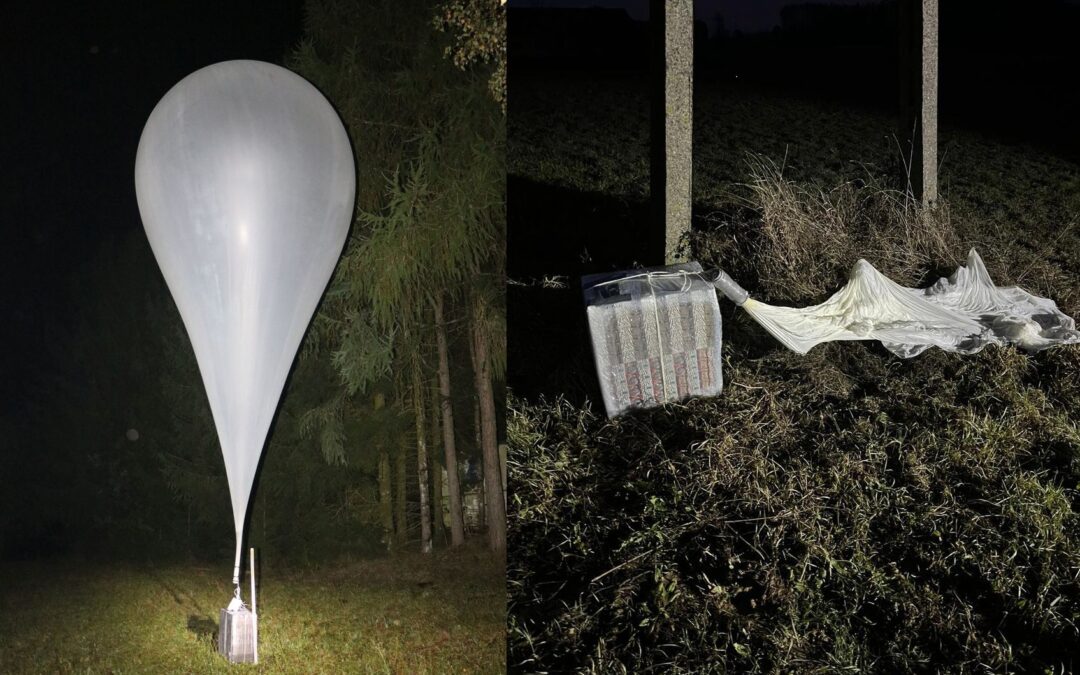Keep our news free from ads and paywalls by making a donation to support our work!

Notes from Poland is run by a small editorial team and is published by an independent, non-profit foundation that is funded through donations from our readers. We cannot do what we do without your support.
One of the side effects of the migration crisis engineered by Belarus on the Polish border – which has led Poland to bolster security there – has been a major decline in the number of cigarettes being smuggled across it.
The situation has forced smugglers to find innovative new ways of getting contraband across the border, including using weather balloons and drones.
1500 paczek papierosów bez polskich znaków skarbowych akcyzy i zatrzymany 37-latek, który przyjechał je odebrać.
👉https://t.co/uFQk56UQyb pic.twitter.com/RA8drt9Lh4— podlaska Policja (@podlaskaPolicja) February 17, 2025
The crisis began in 2021, when Belarus started encouraging and assisting attempts by tens of thousands of migrants and asylum seekers – mainly from the Middle East, Asia and Africa – to irregularly cross the border.
In that same year, the Polish border guard detected 104 million cigarettes being smuggled from Belarus, according to data obtained by broadcaster RMF. However, in 2022 that fell dramatically to 18.7 million, followed by 22.2 million in 2023 and 30.7 million in 2024.
That decline resulted in large part from Poland’s decision to close most border crossings with Belarus in response to the crisis. Previously, most cigarettes were smuggled across by car and train.
Poland has also dramatically increased security away from border crossings, including building a physical wall and electronic surveillance systems along much of the border and posting thousands of soldiers, border guards and police to the area.
However, RMF notes that the uptick in seized cigarettes last year resulted from smugglers using innovative new methods, in particular transporting them by air.
Last September, for example, the border guard reported a series of incidents in which they discovered smugglers sending cigarettes over the border tied to weather balloons and with tracking devices planted inside.
In one of the incidents, two Polish citizens were detained on the Polish side of the border in possession of 1,500 packs of cigarettes worth 24,500 zloty (€5,900). Last week, police detained a man who had come to collect 1,500 packs of cigarettes sent over the border in a balloon.
The number of attempted crossings from Belarus to Poland fell by over 50% in the second half of last year after the Polish government implemented tougher new measures to combat irregular migration, border guard data obtained by @notesfrompoland show https://t.co/fXfmgHIIBS
— Notes from Poland 🇵🇱 (@notesfrompoland) January 10, 2025
RMF notes that, in some cases, drones have also been used to move cigarettes. Neighbouring Lithuania, which also bolstered its border in response to the migration crisis, reported incidents last year in which drones were used to transport up to 1,000 packets of cigarettes before travelling back over the border.
Another trick discovered by Lithuanian border guards in the city of Druskininkai is smugglers packing cigarettes into makeshift rafts, which are then disguised to look like chunks of ice and sent down the river from Belarus into Lithuania. On one weekend earlier this month, 2,000 packets were discovered being smuggled that way.
However, smugglers are also continuing to exploit more traditional methods at the border crossings that remain open. Earlier this month, scans of a freight train at the Siemianówka border crossing uncovered 5,000 packs of cigarettes hidden inside a tank carrying liquid resin.
Przemycają papierosy rzeką na tratwach udających krę.https://t.co/fKX5Qw3lbm
— Fakty RMF FM (@RMF24pl) February 21, 2025

Notes from Poland is run by a small editorial team and published by an independent, non-profit foundation that is funded through donations from our readers. We cannot do what we do without your support.
Main image credit: KMP Suwałki (CC BY-NC-ND 3.0 PL)

Daniel Tilles is editor-in-chief of Notes from Poland. He has written on Polish affairs for a wide range of publications, including Foreign Policy, POLITICO Europe, EUobserver and Dziennik Gazeta Prawna.



















